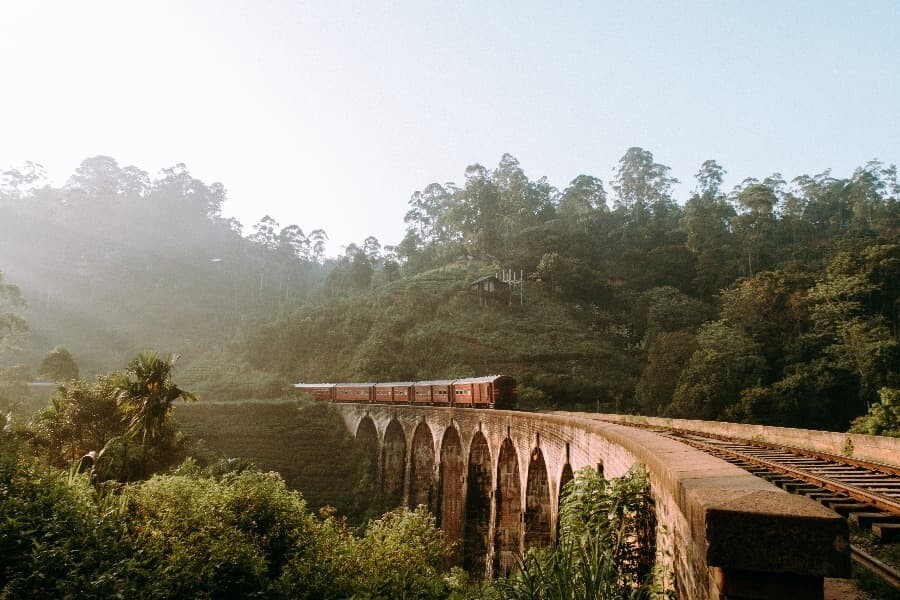Menu Apply

Sri Lanka, officially the Democratic Socialist Republic of Sri Lanka, is located in the Bay of Bengal. Its peculiar pear shape has earned it the nickname “the tear of India”. But this is not the only name by which the island is known. Throughout history, it has also been called Ceylon, Lanka, Selan and even “the island of a thousand names”.
The capital of Sri Lanka is Colombo, a vibrant and cosmopolitan city. The country’s population exceeds 20 million.
The country is affected by the rains of the Yala monsoon between May and August. The Maha monsoon, meanwhile, affects eastern and northern cities between October and January.
It isn’t dangerous to visit the country during these wet seasons. The monsoon’s climate is characterized by a hot, tropical climate with brief and heavy downpours throughout the day. During the rest of the year—the dry season—the climate is warmer, with a temperature of roughly 30 degrees Celsius.

Sri Lanka uses Sri Lanka Standard Time (SLST), which is UTC+5:30. This means it's 5.5 hours ahead of Coordinated Universal Time. Unlike some other regions, Sri Lanka has no Daylight Saving Time, so the time stays constant year-round.

The country’s official currency is the Sri Lankan rupee. 1 euro equates to approximately 160 Sri Lankan rupees (LKR).

Sri Lanka is an island, which is why we have programs in different areas of the island.

The stay begins as soon as the volunteer is picked up at the destination.

The meals included in the project/destination will be provided at the accommodation. Meals will not be included for the journeys to the destination, the excursions undertaken by volunteers, etc.

The stipulated pick-up times for each destination/project must be respected. Volunteers who arrive outside of this day/window will have to pay an additional cost, depending on the destination.
Sri Lanka is an island, which is why we have programs in different areas of the island.
Rambukkana, located two hours northwest of Colombo, is a small place inhabited by locals, with its main attraction being the Pinnawala Elephant Reserve. This is where the volunteers carry out their work. Volunteers stay in the same town and can either walk or take a daily tuk-tuk to get to the project.
Volunteers must arrive at Bandaranaike International Airport (airport code CMB), where they will be picked up by local staff and then transported to their accommodation.
For volunteers participating in programs in Rambukkana, it is recommended to arrive on the weekend.
Sri Lankan cuisine is characterized by its generous use of spices. Its meals are based on rice and curry, always accompanied by chicken, fish or vegetables. Much like Indian food, Sri Lankan cuisine is generally spicy. Dishes are often served with a small flatbread called “naan”.
The national drink, and a symbol of the country, is tea. It is considered to be the best tea in the world, although foreigners often find it too strong.
The island’s transportation system is somewhat chaotic. The most popular way of getting around Sri Lanka is by “tuk-tuk”, which is a type of local taxi. The drivers usually charge for the distance covered; however, this is sometimes altered by the number of people in any given journey.
It will take the volunteers 10-20 minutes to get from the accommodation to the program site. Daily commute fees are not included in the price. However, the volunteer can easily walk to the program site, or could take a “tuk-tuk” at a cost of no more than €3 a day.
The island enjoys an impressive biodiversity, and remained largely unexplored by tourists and adventure-seekers until relatively recently. However, since 2010 it has been attracting greater numbers of visitors.
Sri Lanka’s green hills and tea plantations are iconic images of the country. By taking a ride on the Sri Lankan Tea Train, you’ll be treated to views of leafy, green landscapes.
Another famous mountain is Adam’s Peak, which Buddhists refer to as “Buddha’s footprint”. This mountain, which is believed to be the first place that man stepped foot on earth, is a pilgrimage site for Buddhists.
The main focus of this teaching program is to offer English classes to locals who cannot afford private language lessons.
The volunteer will notice that not all locals have a good level of English, especially those not involved in tourism. Additionally, due to their age, many of the local children do not have a good level of English.
Volunteers attend preschools, public schools, local temples/monk schools, or community centers to teach 2 to 3 classes per day to students aged 3 to 15, typically with 5 to 15 students per class.
A unique aspect of this program is that volunteers have the opportunity to teach Buddhist monks at a Buddhist school near Rambukkana. Volunteers will visit this center 2-3 afternoons a week since most monk schools start in the afternoons.
It is recommended that volunteers have a good level of English and confidence in their ability to teach written, spoken, and reading English. Being a qualified or experienced teacher is not essential. However, we encourage volunteers to come prepared by completing relevant training for teaching English and engaging in other activities with the children.
Location: Rambukkana
Volunteers with Cooperating Volunteers assist at an elephant conservation center and breeding sanctuary originally established to care for and protect numerous orphaned, injured, or rescued wild elephants found in the jungle.
The main goal of our elephant volunteer project is to help with the daily operations of the orphanage. Working under the guidance of the mahout (the person in charge of elephant care) and alongside other volunteers. It’s important to recognize that through volunteering, you’re contributing to the long-term care of the elephants.
Volunteer tasks include:
Example of a day in the elephant program:
7:45 a.m. – Breakfast
8:30 a.m. – 12 p.m. – Assisting mahouts in cleaning elephant enclosures, preparing food for sick and elderly elephants, interacting with elephant calves, or washing elephant calves.
12:00 p.m. – 2:00 p.m. – Lunch break.
2:00 p.m. – 4:00 p.m. – Observing elephants bathing and playing in the river, washing elephants in the river.
6:30 p.m. – 7:00 p.m. – Dinner
After dinner, volunteers have free time to spend as they wish.
*Indicative schedule
Location: Rambukkana (minimum stay 1 week)
By joining the medical project in Sri Lanka, you will be able to observe patients in one of the oldest and largest hospitals. You will also visit Sri Lanka’s highlands, famous for their tea plantations.
Work in a Sri Lankan hospital, learn about their medical system, techniques, and procedures by observing alongside experienced and knowledgeable hospital staff.
Volunteers specifically assist patients and staff during their stay in the hospital.
Some of the volunteer tasks include:
Working hours: 4-5 hours a day LOCATION: Rambukkana.
For the Rambukkana location, the center is in Kurunegala, about 28 km from the volunteer house. The one-way journey to the program takes about 45-50 minutes by bus (one euro in total for the round trip).
This project is recommended for students or professionals in the healthcare field. An English CV is required for this project.
In the teaching, medical, and elephant volunteer programs in Rambukkana, volunteers will be accommodated in the volunteer residence house. Most rooms are double occupancy, so volunteers share a room with one other volunteer. In the rooms, volunteers have a mosquito net and a fan, which will make their stay more comfortable. Bathrooms are also shared. The residence is hostel-style and offers free WiFi for volunteers.
Volunteers will receive three daily meals. The meals have been adapted for volunteers, combining Sri Lankan cuisine with some Western dishes. For breakfast, volunteers typically have toast with butter or omelets, tropical juices, and a typical Sri Lankan item like “rotee.” For lunch and dinner, the dishes are similar, always consisting of rice and either a vegetable, chicken, or fish dish.
Note: The volunteer is responsible for their daily water expenses.
The total cost of the volunteer program is broken down into 2 parts. The inscription fee that is paid to book your spot in the program 210 euros, and the program fee which is paid afterward. The following list gives a breakdown of the program fee for each project.
€280 for 1 week
€440 for 2 weeks
€600 for 3 weeks
– In Rambukkana:
€280 for 1 week
€440 for 2 weeks
€600 for 4 weeks
– In Rambukkana:
€440 for 1 week
€340 for each additional week thereafter
If your currency is not specified in the list, you can convert the costs here.
Visa, flights, travel insurance (obligatory), vaccines, airport return, other expenses such as bottled water, toilet paper and daily commute costs.
(*** Volunteers in Sri Lanka will generally find that €25 (approx. 30 USD) is enough to cover basic weekly expenses.)
| Address: | New York, United States |
| Address: | Avinguda Carrilet, 3, Edifici D, planta 2a, 08902 L’Hospitalet de Llobregat (Barcelona) |
| Phone: | +34 931 890 904 - Office- Barcelona |
| Email: | hello@cooperatingvolunteers.com |
| WhatsApp: | +34 671 94 28 89 |

Cooperating Volunteers, S.L. All rights reserved © 2014
Leave us your information and we will contact you within the next 24 hours
Our volunteers will be able to validate university credits with the aim of traveling in a more responsible and economical way.
What does volunteering focused on university practices involve?
At Cooperating Volunteers, we make agreements with different universities to validate university credits with the aim of traveling in a more responsible and economical way.
The specialties we work with are extensive: medical volunteering, nursing, education, social work, psychology, physiotherapy, engineering, architecture…
The practices can be carried out in our designated destinations for this purpose, as well as in Spain.
If you choose an international destination, it’s a unique way to live an unforgettable and enriching experience, as you will have the opportunity to continue your education in another country, with a completely different culture.
Stepping out of our comfort zone and being part of the various projects at the destination will allow us to grow both personally and professionally, creating a more extensive curriculum.
And we are fully convinced that this experience will accompany you throughout your life.
You will be able to visit hospitals, schools, centers, orphanages, and participate directly and actively in the daily lives of all those people at the destination, always accompanied by other professionals willing to collaborate hand in hand with you and guide you in daily tasks.
If your university is not part of the agreement with Cooperating Volunteers, you can contact cristina@cooperatingvolunteers.com so that we can get in touch and make this experience a reality.
Corporate volunteering consists of tailored programs for your company, designed to develop teamwork skills.
It is proven that teamwork directly impacts productivity.
Collective effort surpasses individual capabilities, promotes diversity of skills, stimulates creativity, and facilitates problem-solving in the face of various challenges.
Therefore, it not only maximizes efficiency but also enriches the work environment.
We conduct corporate volunteering programs that consist of customized programs for your company, designed to develop teamwork skills, improve performance, and foster unity among employees.
We tailor projects to the corporate identity and size of the company, and we can adjust them to any destination and time of the year.
The advantages of corporate volunteering include:
The future is aligned with a more responsible society, and participating in social projects positions our company among the list of revolutionary businesses that want to be part of the change.
If you resonate with this message, corporate volunteering is a unique experience both individually and collectively, and at Cooperating Volunteers, we accompany you throughout the process to make it a unique journey.
Quality time spent with family strengthens emotional bonds, promotes communication, and contributes to the emotional well-being of its members.
Spending quality time with family and being able to disconnect from our hectic routines is not only enriching but also necessary.
Sometimes we forget to communicate, connect, and dedicate time to each other. Each one of us lives focused on our jobs, schools… And it’s necessary to find the opportunity to pause and take care of ourselves.
Quality time spent with family strengthens emotional bonds, promotes communication, and contributes to the emotional well-being of its members. And of course, it creates lifelong positive memories.
At Cooperating Volunteers, we suggest moving away from those ‘more superficial’ trips (which can also be fantastic), but we invite you to live this experience to bring out our most empathetic and humanitarian side.
Family volunteering gives us the opportunity to be part of a positive impact, promoting values of solidarity and social responsibility.
There are many families who choose to experience these trips focused on cooperation and direct involvement with different communities around the world, where living conditions are very different and sometimes entirely precarious.
Projects are tailored to different ages, allowing us to work together.
An incredible way to fill our suitcase with memories, learning, and knowledge.
And although stepping out of our comfort zone often feels daunting, we assure you firsthand that it’s worth it.
At Cooperating Volunteers, we accompany you throughout the entire experience, from start to finish, to make it unforgettable.
At Cooperating Volunteers, we believe it’s never too late for anything, especially for volunteering and living a unique and unforgettable experience.
There are many people, increasingly so, who opt for responsible travel that involves social work.
Accustomed to organized and mostly touristic trips, at Cooperating Volunteers, we want to advocate for a more enriching experience, one that transforms us from within and allows us to be part of the change the world needs to see.
We can adapt both the destination and the duration of our projects to fit your needs.
It’s an opportunity full of emotions that allows us to significantly contribute to different communities and their evolution. And you can participate in different areas such as education, social support, or assistance in different centers.
Some of the benefits include:
Living this experience will undoubtedly be a before and after.
A volunteering initiative with leadership and impact through the educational action program.
When we talk about social volunteering, we refer to all those actions and activities carried out altruistically, selflessly, and with the aim of addressing multiple problems and needs of different communities, always focused on education and self-sufficiency.
Education is essential because it provides the tools and knowledge necessary for personal, social, and economic development.
Our goal is to create self-sufficient communities and provide opportunities for the future personal development of each member. The message is not to ‘give’, but to accompany in the process of training for self-managed provision.
At Cooperating Volunteers, many of our destinations and projects embrace this type of volunteering. Some of our projects include: community programs, education, women’s empowerment…
And although they are completely different from each other, they share a single objective: progress towards a society that can embrace us all in the same way.
If you are someone who is restless, who needs to see a change in the future, volunteering is an experience tailor-made for you.

